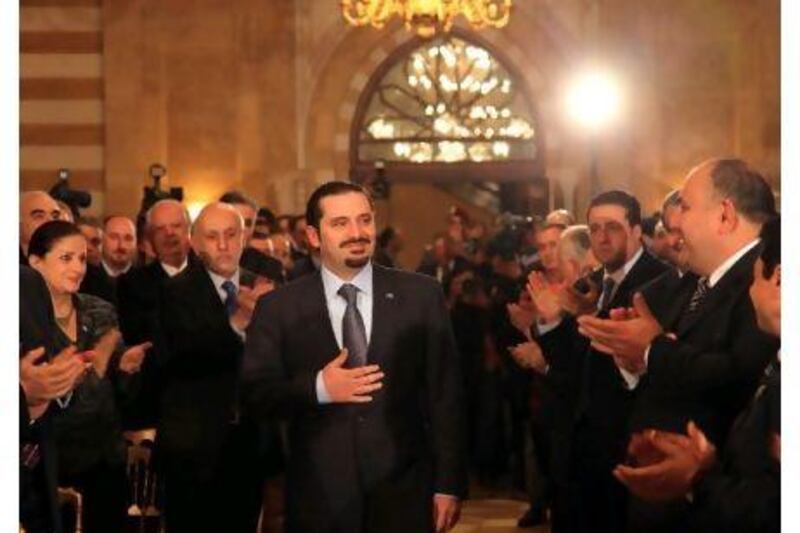RIYADH // Saudi Arabia's decision this week to abandon its mediating role in Lebanon arose from deep frustration with Syria's perceived lack of co-operation, and appears to signal an end to King Abdullah's two-year-old bid to mend ties with Damascus, analysts said.
The development underscores the two nations' underlying differences, backed by powerful supporters outside the region - Iran and the United States - over the future of the United Nations special tribunal charged with getting to the bottom of who killed the former Lebanese prime minister Rafiq Hariri.
The Saudi-Syrian breach, months in the making, also throws into high relief Lebanon's internal crisis, brought on mainly by the efforts of Syria and Hizbollah to obstruct the tribunal's work out of the fear that they will be implicated in Hariri's murder. No doubt, the Saudi foreign minister, Prince Saud Al Faisal, was using a heavy dose of diplomatic brinkmanship in declaring late on Tuesday that a frustrated King Abdullah "has washed his hands" of the joint Syrian-Saudi mediating effort.
And indeed, the prince clarified in another interview yesterday that the kingdom "will always support Lebanese legitimacy", signalling that Riyadh is not abandoning its Lebanese allies, principally caretaker Prime Minister Saad Hariri, son of the assassinated leader.
Still, the Saudis' frustration with Syria casts a shadow over an already deeply troubled Lebanon that appears sliding towards another round of violence.
Hariri's 2005 assassination caused a deep rupture in Syrian-Saudi relations because most in the Saudi establishment held Syria, which then had thousands of troops in Lebanon, responsible for Hariri's death.
But at a 2009 Arab summit in Kuwait, King Abdullah publicly reached out with words of reconciliation to the Syrian president, Bashar Assad, in a bid to wean Syria away from its close relationship with Iran and defuse tensions among Arab states.
Mr Assad responded positively and the two leaders exchanged visits. Saudi Arabia had several requests for Syrian policy changes relating to Lebanon, but Syria dragged its feet on complying with those requests.
The issue that became increasingly problematic between the two states, however, was the work of the Special Tribunal for Lebanon (STL), established by a UN Security Council resolution to bring Hariri's killers to justice. Leaks from the secretive tribunal suggested that its findings would blame some Hizbollah officials for the car bomb that killed Hariri.
Hizbollah, backed by Syria and Iran, began demanding that Mr Hariri thwart the tribunal's work by withdrawing the Lebanese judges seconded to it and ending Lebanese funding. It also demanded that Mr Hariri reject the memorandum of understanding Lebanon had signed with the UN setting out its responsibilities to the tribunal.
Hizbollah maintains that the STL is controlled by the United States and Israel, who are using it against the militant group.
"The Syrians and Hizbollah think Saudi Arabia can pressure the United States and the United Nations to cancel the tribunal," said Mustafa Alani, the director of security studies at the Dubai-based Gulf Research Center. "But the Saudis are both unwilling and unable to do this."
To Riyadh's annoyance, Syria also tried sabotaging the tribunal by demanding that some Lebanese witnesses be tried for giving false testimony to the court.
Mr Hariri refused all these demands. Instead, he made a counter-offer to Hizbollah: anyone indicted by the tribunal would be viewed as a "rogue" element of Hizbollah and the party leadership would not be implicated in the accused's actions.
Mr Alani, the analyst, said Mr Hariri's compromise was modelled on a similar deal that paved the way for the trial of the two Libyans accused of planting the bomb that brought down Pan Am 103 over Lockerbie, Scotland, killing 270 people. In that instance, the Libyan leader, Moammar Qadafi, was persuaded to turn over the Libyan agents in return for a promise that he himself or the Libyan state would not be judicially prosecuted, Mr Alani said.
Under pressure from Saudi Arabia, Mr Hariri also apologised to Damascus for public remarks he had made implying that Syria was responsible for his father's death.
Then on January 12, while Mr Hariri was in Washington to see President Barack Obama, Hizbollah, which holds the balance of power among the opposition parties in Lebanon, raised the stakes by withdrawing its ministers from the governing coalition then headed by Mr Hariri. The government collapsed.
On Monday, the STL turned in its first sealed, draft indictment to a judge in The Hague. The next day, Prince Saud al Faisal had a testy exchange with Syrian deputy foreign minister, Faisal al Miqdad, in Egypt over the lack of Syrian co-operation on defusing the crisis.
Hours later, he announced the end of Saudi mediation, warning that Lebanon's situation had become "dangerous."
By withdrawing from their mediation role, "the Saudis are basically saying they don't trust Syria", Mr Alani said. The Syrian response, he added, is likely to be more efforts to "destabilise Lebanon and closer relations with Iran on a strategic level".
Nadim Shehadi, a Lebanon analyst and Associate Fellow in the Middle East and North Africa Programme at London's Chatham House, said the Saudis are right to be annoyed because "the bottom line is that the Syrians ... have no intention of delivering anything on Lebanon".
To understand the latest crisis, Mr Shehadi added, one should "forget the details because the large picture is extremely simple: it's all about the tribunal".
In this instance, Mr Shehadi said, "there are two sides. Side A is the victims of the crime and Side B is the suspects. The suspects are trying their best to kill the tribunal by putting pressure on the victim's side. Syria and Hizbollah feel threatened by the tribunal".





